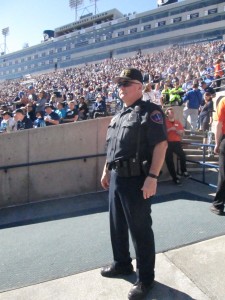
High in the Lavell Edward Stadium boxes, University Police Lt. Arnold Lemmon, uses binoculars looking for any abnormal crowd activity. Crammed in the room with him are four other men: one from Provo Police, one from the Provo Fire Department, one from BYU Crisis Management, and one from Event Staff. These five organize the protection for all BYU football games.
This team prepares a safety and protection plan weeks in advance of each game. To the best of its ability, it follows the “Intercollegiate Athletics Safety and Security Best Practices Guide,” which is revised every year at the annual National Intercollegiate Athletics Safety and Security Summit.
A representative from each of these five organizations become the incident commanders at BYU football games. Each commander becomes the official decision maker for any crisis or incidents that fall underneath their jurisdiction. University Police covers law enforcement in the stadium. Special Events covers any ticketing issues. Risk Management makes the call about whether or not to evacuate the stadium in bad weather conditions. Provo Police covers law enforcement on public property, and Provo Fire Department covers all fires and medical calls.
Overall, these five men coordinate and supervise the work of hundreds of security officials.
Student security is stationed at each gate to look through bags and watch for any suspicious activity. They are supervised by University Police officers. Posted at every gate is a list of items not allowed in the stadium. Officers are there as backup for unknown or questionable item.
“If their bags are super full and its not [a] cold day, that’s suspicious.” said Shawn Worthen, a junior at BYU studying economics who works as a student security guard. “You don’t really need anything to watch a football game.”
Officers stationed around and on the field watch the crowd for any disturbances.
“Most of the time what we are doing is trying to make sure people are having a good experience,” said Sgt. Jeff Vest of the University Police.
The five incident commanders observe the crowds during the game to gauge the energy level of the crowd. They discuss any issues presented to them by dispatch. Two dispatchers have an office next to the incident commanders and relay information from the five other dispatchers on duty.
“Here it is right down and very efficient,” said Lt. Arnold Lemmon. Though the chance of a high risk situation is rare, the incident commanders are prepared.
With the game’s outcome unknown, the incident commanders have prepared different post game plans. Depending on the outcome, officers are told to go to post game location A, B, or C. Traffic and parking draw a large number of officers and security guards. Once parking and traffic have returned to normal, the security force is dismissed to go home.




